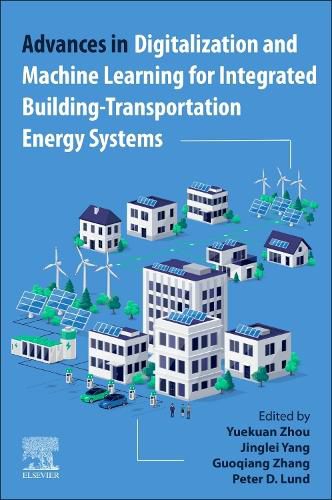Readings Newsletter
Become a Readings Member to make your shopping experience even easier.
Sign in or sign up for free!
You’re not far away from qualifying for FREE standard shipping within Australia
You’ve qualified for FREE standard shipping within Australia
The cart is loading…






Advances in Digitalization and Machine Learning for Integrated Building-Transportation Energy Systems examines the combined impact of buildings and transportation systems on energy demand and use. With a strong focus on AI and machine learning approaches, the book comprehensively discusses each part of the energy lifecycle, considering source, grid, demand, storage, and usage. Opening with an introduction to smart buildings and intelligent transportation systems, the book presents the fundamentals of AI and its application in renewable energy sources, alongside the latest technological advances.
Other topics presented include building occupants' behavior and vehicle driving schedule with demand prediction and analysis, hybrid energy storages in buildings with AI, smart grid with energy digitalization, and prosumer-based P2P energy trading. The book concludes with discussions on blockchain technologies, IoT in smart grid operation, and the application of big data and cloud computing in integrated smart building-transportation energy systems. This title provides critical information to students, researchers, and engineers wanting to understand, design, and implement flexible energy systems to meet the rising demand in electricity.
$9.00 standard shipping within Australia
FREE standard shipping within Australia for orders over $100.00
Express & International shipping calculated at checkout
Advances in Digitalization and Machine Learning for Integrated Building-Transportation Energy Systems examines the combined impact of buildings and transportation systems on energy demand and use. With a strong focus on AI and machine learning approaches, the book comprehensively discusses each part of the energy lifecycle, considering source, grid, demand, storage, and usage. Opening with an introduction to smart buildings and intelligent transportation systems, the book presents the fundamentals of AI and its application in renewable energy sources, alongside the latest technological advances.
Other topics presented include building occupants' behavior and vehicle driving schedule with demand prediction and analysis, hybrid energy storages in buildings with AI, smart grid with energy digitalization, and prosumer-based P2P energy trading. The book concludes with discussions on blockchain technologies, IoT in smart grid operation, and the application of big data and cloud computing in integrated smart building-transportation energy systems. This title provides critical information to students, researchers, and engineers wanting to understand, design, and implement flexible energy systems to meet the rising demand in electricity.